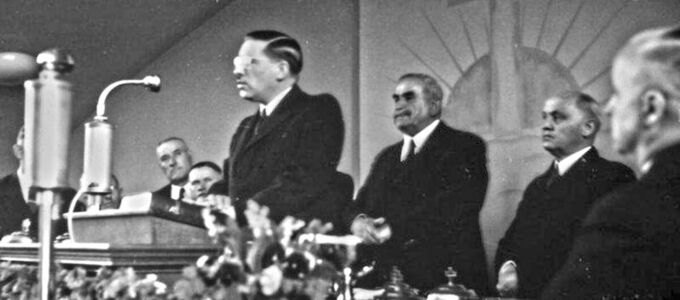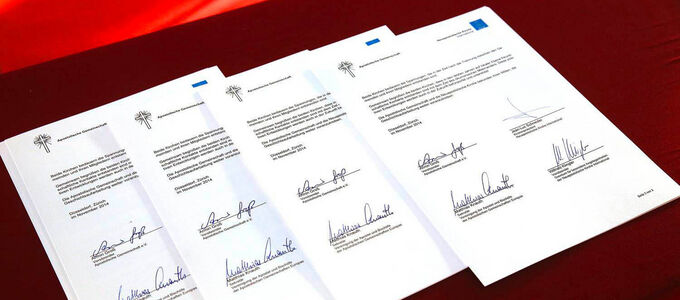
He had been designated as the next Chief Apostle. Even so, he was excommunicated from the Church. Seventy-five years ago today, District Apostle Peter Kuhlen was installed as Chief Apostle Helper and successor—an occasion to pay tribute. But what exactly to? Here are a few personal words on the subject.
It is 1 August 1948. We are in Bielefeld in Germany. Chief Apostle Johann Gottfried Bischoff steps behind the altar with an announcement that surprises many: “You are aware that I am getting on in years,” the 77-year-old Church leader said. “Some time ago, the Apostles approached me on this subject and I named Apostle Kuhlen as my future successor.”
The Apostle’s College had already voted on the succession on 21 May 1948 in Frankfurt by secret ballot. The overseas Apostles had also given their consent. “As long as I am still here and am able to work, he will be my deputy,” the Chief Apostle described Apostle Kuhlen’s role. “However, the moment the Lord calls me home, be it because of illness or otherwise, he [Kuhlen] will immediately take my place.”
Division over the “message”
Two years later the Chief Apostle Helper resigned. From 25 November 1950 on he was once again exclusively active as a District Apostle for the Rhineland area in Germany. On 23 January 1955 he was then dismissed from office and expelled from the New Apostolic Church.
This was due to differing opinions regarding what is known as the message: the proclamation of Chief Apostle Bischoff that the return of Christ would take place during his lifetime. Together with two other Apostles who had been excommunicated, Peter Kuhlen established today’s Apostolische Gemeinschaft (Apostolic Community) in Germany.
Blame, suspicions, injuries
So much for the hard facts. There are many possible interpretations. For example, how personal beliefs are dogmatically exaggerated. Or how attempts of applying the principle of collective responsibility are shattered by strict hierarchical resistance. Or how the struggle for interpretive predominance leads to exaggerations and a growing disparity.
All these aspects tell stories of strife and conflict. And that is the worst thing about the whole story: divisiveness and the formation of camps led to placing blame, to suspicions, and to injuries. Fissures developed that tore families and congregations apart. Controversial statements and defamation on both sides have subsequently deepened the rifts between the two churches.
Admission of guilt, forgiveness, reconciliation
However, there are other stories to tell too. For example, about people who reached out to one another across all divides, and about friendships that were stronger than any spirit of division: for example between District Apostle Hermann Engelauf and Werner Kuhlen, the son of the former Chief Apostle Helper. This is where the tender seedling of a reconciliation process took root, and was almost trampled underfoot.
In 2007, a historic reappraisal failed because it consisted more of assigning guilt rather than recognising and admitting faults. Meanwhile: “Reconciliation takes place when faults are acknowledged and forgiveness is sought,” emphasises the Declaration on Reconciliation between the Apostolic Community and the New Apostolic Church, which was signed in 2014. “This is the purpose of this declaration.”
In this document, both churches regret “the inappropriate behaviour of church leaders and members” as well as “the tensions that have arisen between the congregations and their members in the period following the separation”. And the New Apostolic Church “expressly apologises” for the excommunications and their consequences.
A personal choice
Yes, today is a day of commemoration. Which image comes to mind? The black and white photo of District Apostle Kuhlen walking behind the Chief Apostle and his son at a clear distance? Or the colour photo of his son, Werner Kuhlen, beaming with joy as he embraces one of the delegates at the signing ceremony of the declaration of reconciliation.
Commemoration is free. Today, some will have their eyes on the status of reconciliation, while others are still fixated on the conflict. And then there are those who want to repeat the mistake of 2007 by bringing up old recriminations. Whichever day of remembrance one chooses: the choice says more about the person in question than about the matter itself and how things stand today, 75 years later.
















